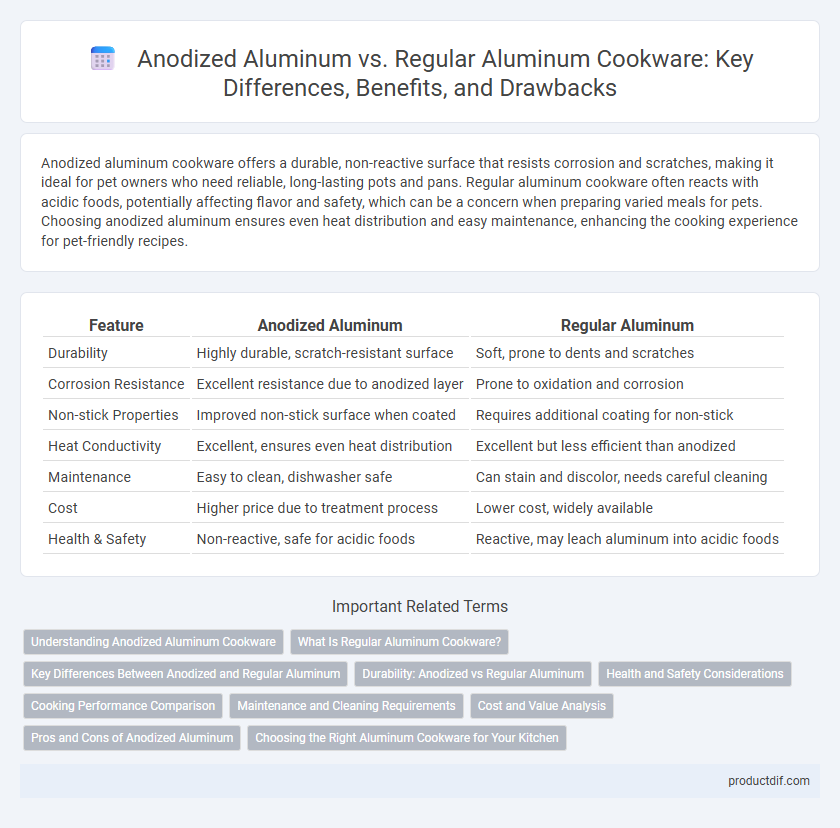Anodized aluminum cookware offers a durable, non-reactive surface that resists corrosion and scratches, making it ideal for pet owners who need reliable, long-lasting pots and pans. Regular aluminum cookware often reacts with acidic foods, potentially affecting flavor and safety, which can be a concern when preparing varied meals for pets. Choosing anodized aluminum ensures even heat distribution and easy maintenance, enhancing the cooking experience for pet-friendly recipes.
Table of Comparison
| Feature | Anodized Aluminum | Regular Aluminum |
|---|---|---|
| Durability | Highly durable, scratch-resistant surface | Soft, prone to dents and scratches |
| Corrosion Resistance | Excellent resistance due to anodized layer | Prone to oxidation and corrosion |
| Non-stick Properties | Improved non-stick surface when coated | Requires additional coating for non-stick |
| Heat Conductivity | Excellent, ensures even heat distribution | Excellent but less efficient than anodized |
| Maintenance | Easy to clean, dishwasher safe | Can stain and discolor, needs careful cleaning |
| Cost | Higher price due to treatment process | Lower cost, widely available |
| Health & Safety | Non-reactive, safe for acidic foods | Reactive, may leach aluminum into acidic foods |
Understanding Anodized Aluminum Cookware
Anodized aluminum cookware features a durable, non-reactive surface created through an electrochemical process that thickens the natural oxide layer of the metal, enhancing corrosion resistance and preventing food from reacting with the pan. Regular aluminum cookware, while lightweight and an excellent heat conductor, tends to react with acidic or alkaline foods, which can alter taste and discolor the surface. Anodized aluminum offers superior durability and easier maintenance, making it a popular choice for long-lasting, high-performance cookware.
What Is Regular Aluminum Cookware?
Regular aluminum cookware is made from pure aluminum or aluminum alloys, known for excellent heat conductivity and lightweight properties. It often lacks a protective coating, making it prone to scratches, dents, and potential reactions with acidic foods that can affect flavor and safety. Compared to anodized aluminum, regular aluminum cookware is more affordable but less durable and more susceptible to corrosion and surface damage.
Key Differences Between Anodized and Regular Aluminum
Anodized aluminum cookware features a hard, non-reactive surface created through an electrochemical process that enhances durability, scratch resistance, and corrosion protection compared to regular aluminum. Regular aluminum is softer, more prone to oxidation, and can react with acidic foods, potentially altering flavor and leaching metal ions. The anodized layer ensures safer cooking with improved heat distribution and longevity, making it a preferred choice for performance and maintenance.
Durability: Anodized vs Regular Aluminum
Anodized aluminum cookware features a hardened surface layer that significantly enhances scratch resistance and corrosion protection compared to regular aluminum. This durability improvement prevents warping and extends the lifespan of cookware under frequent high-heat cooking conditions. Regular aluminum cookware tends to degrade faster due to its softer, more reactive surface, making anodized options preferable for long-term use.
Health and Safety Considerations
Anodized aluminum cookware features a hardened, non-reactive surface that prevents aluminum leaching into food, reducing potential health risks associated with regular aluminum, which can react with acidic or alkaline ingredients. Studies indicate that anodized aluminum's sealed layer enhances durability and resists corrosion, offering safer cooking conditions compared to untreated aluminum that may release trace amounts of aluminum during cooking. For those concerned about aluminum exposure linked to neurological conditions, anodized aluminum pots and pans provide a reliable option for minimizing contamination and ensuring safer food preparation.
Cooking Performance Comparison
Anodized aluminum cookware offers superior cooking performance compared to regular aluminum due to its enhanced heat distribution and non-reactive surface, which prevents food from sticking and reacting with acidic ingredients. The hard, durable anodized layer improves scratch resistance and maintains even cooking temperatures, reducing hot spots and burning. Regular aluminum, while lightweight and conductive, tends to warp and react with acidic foods, potentially affecting flavor and durability.
Maintenance and Cleaning Requirements
Anodized aluminum cookware features a hard, non-porous surface that resists scratches and corrosion, making it easier to clean and maintain without the risk of aluminum leaching. Regular aluminum cookware requires gentle cleaning methods as it is prone to oxidation and can develop pitting or discoloration over time. Using mild detergents and avoiding abrasive scrubbers prolongs the lifespan of both types, but anodized aluminum offers superior durability with less frequent maintenance.
Cost and Value Analysis
Anodized aluminum cookware typically costs 20-30% more than regular aluminum due to its enhanced durability and non-reactive surface. The anodization process creates a harder, corrosion-resistant coating that extends the cookware's lifespan, offering better long-term value despite the higher upfront price. Regular aluminum is cheaper but prone to scratching and reacting with acidic foods, often requiring replacement within a few years.
Pros and Cons of Anodized Aluminum
Anodized aluminum cookware offers enhanced durability and resistance to corrosion compared to regular aluminum, making it less prone to scratches and warping under high heat. Its non-reactive surface prevents food from absorbing metallic tastes or discoloring, which is a key advantage over untreated aluminum. However, anodized aluminum can be more expensive and may lose its coating if scrubbed with abrasive materials, requiring careful maintenance to preserve its non-stick properties.
Choosing the Right Aluminum Cookware for Your Kitchen
Anodized aluminum cookware offers enhanced durability, scratch resistance, and non-reactive surfaces compared to regular aluminum, making it ideal for long-term use and cooking acidic foods. Regular aluminum cookware is lightweight and conducts heat well but can react with certain ingredients and wear down faster. Selecting anodized aluminum ensures better performance and longevity, especially for high-heat cooking and frequent use in your kitchen.
Anodized Aluminum vs Regular Aluminum Infographic

 productdif.com
productdif.com